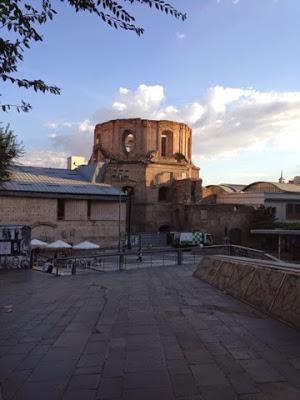
We often think that the histories of nations or peoples take turning points. A series of events occur that could have gone either way, things went badly rather than well, and the future development of this people is forever changed. It is on a different branch line, going to a different destination altogether. And if these events had not occurred, the future would have been different in truly meaningful ways. Because Germany was defeated in 1945 Europe was set on a different course, peaceful and democratic. Because Mao's army survived the Great March, the revolution prevailed and China turned direction.
So we tend to think of history as having turning points. But how valid is this idea?The most important and searing event in the history of Spain in the past century is the Civil War. A democratically elected Republican government was challenged and attacked by a renegade general, a fascist movement incorporating much of the military took up arms, the country was torn apart, and Franco prevailed. Moreover, his ascent began a period of vicious repression, with massive killings of the erstwhile enemies of the fascists. (A Spanish professor in his sixties recently described it to me as second only to the period of Pol Pot in Cambodia, based on the experiences and memories of his own family in Madrid.) It is evident that the memories and monuments of the Civil War are alive in Spain -- the nation was profoundly affected by the years of war, repression, and dictatorship. (My own first visit to Madrid was in 1973 -- closer then in time to the Civil War than I am now to that visit. And the echoes of that time seemed alive in the streets of Madrid and Malaga. And in a visit to Asturias in 2003 I observed a quiet but impassioned disagreement between the provost and the chief librarian over the question of who had destroyed the library-- anarchist miners or Franco's Moroccan troops.)So we might say that Spain confirms the idea of turning points. The memories, antagonisms, and monuments of the Civil War are still powerful in Spanish consciousness.But we might look at Spain differently as well. It is now a European democracy. The currents of nationalism and fascism seem to have been extirpated -- fascism is more visible in Greece and even Great Britain than in Spain -- in language, in extremist parties, in violence against immigrants. And, of course, the period of Franco's dictatorship is now a distant memory. So might we better say that the Civil War and the dictatorship were short disturbances in Spain's longterm development as a modern democratic and tolerant state? Might we speculate that the current realities of Spain were on the agenda with or without the Civil War? It seems that Franco and his fascists left no permanent imprint on Spain. Is it perhaps better to think of the Civil War as a terrible national trauma that the Spanish people have nonetheless assimilated? Is Spain today more analogous to an adult whose past is traumatic but whose present is emotionally strong?This way of thinking about Spain's past eighty years casts doubt on the idea of a turning point--at least in this case. Nothing in history is determined, and that extends to national political trajectories. Even China's future development is uncertain, the power and importance of the revolution notwithstanding. And it is possible that China in 2060 will look very different from the Party dictatorship that is the current legacy of 1949. If this is case the Revolution itself was not a "turning point" for China, but rather just one more contingent event in its very long history.